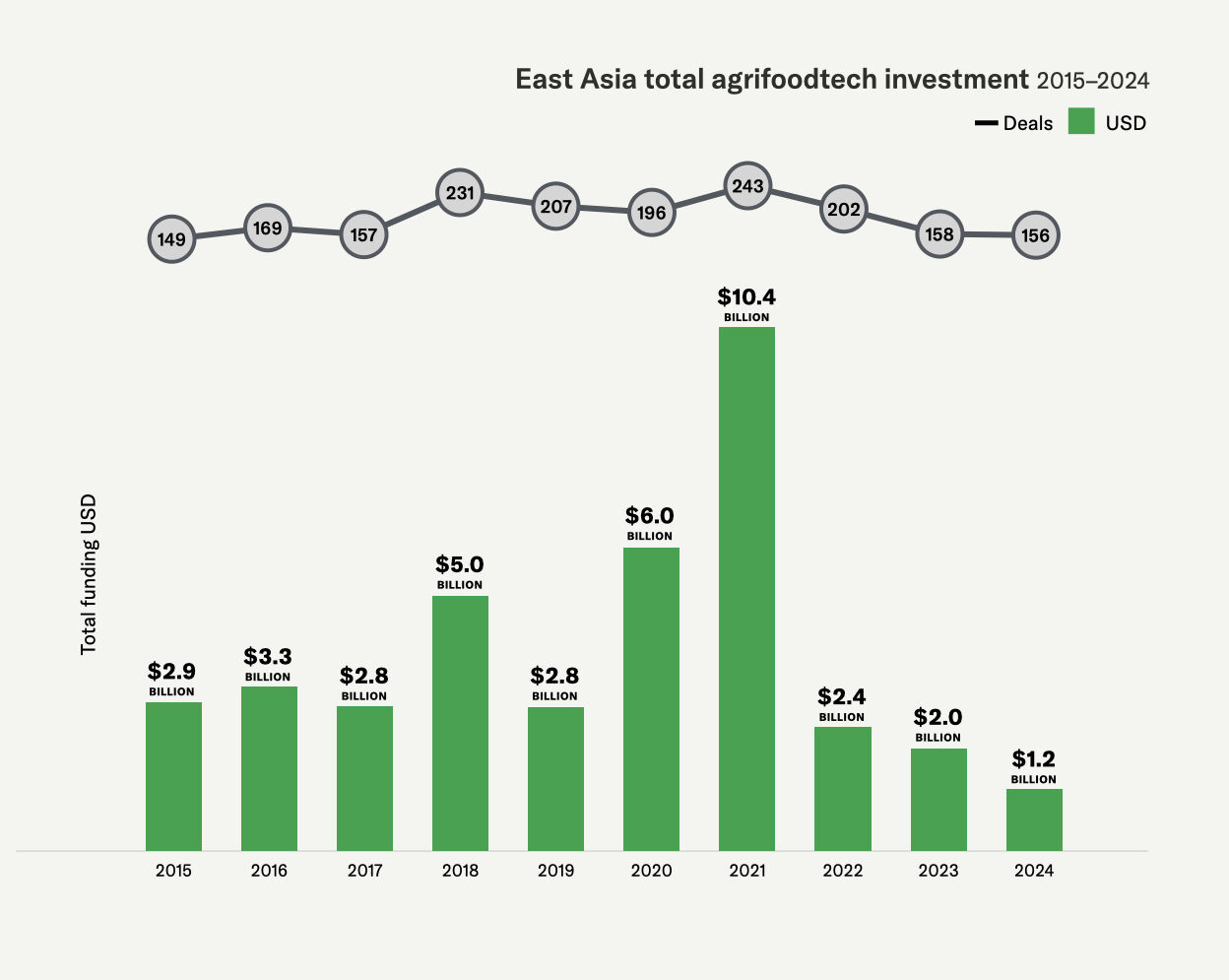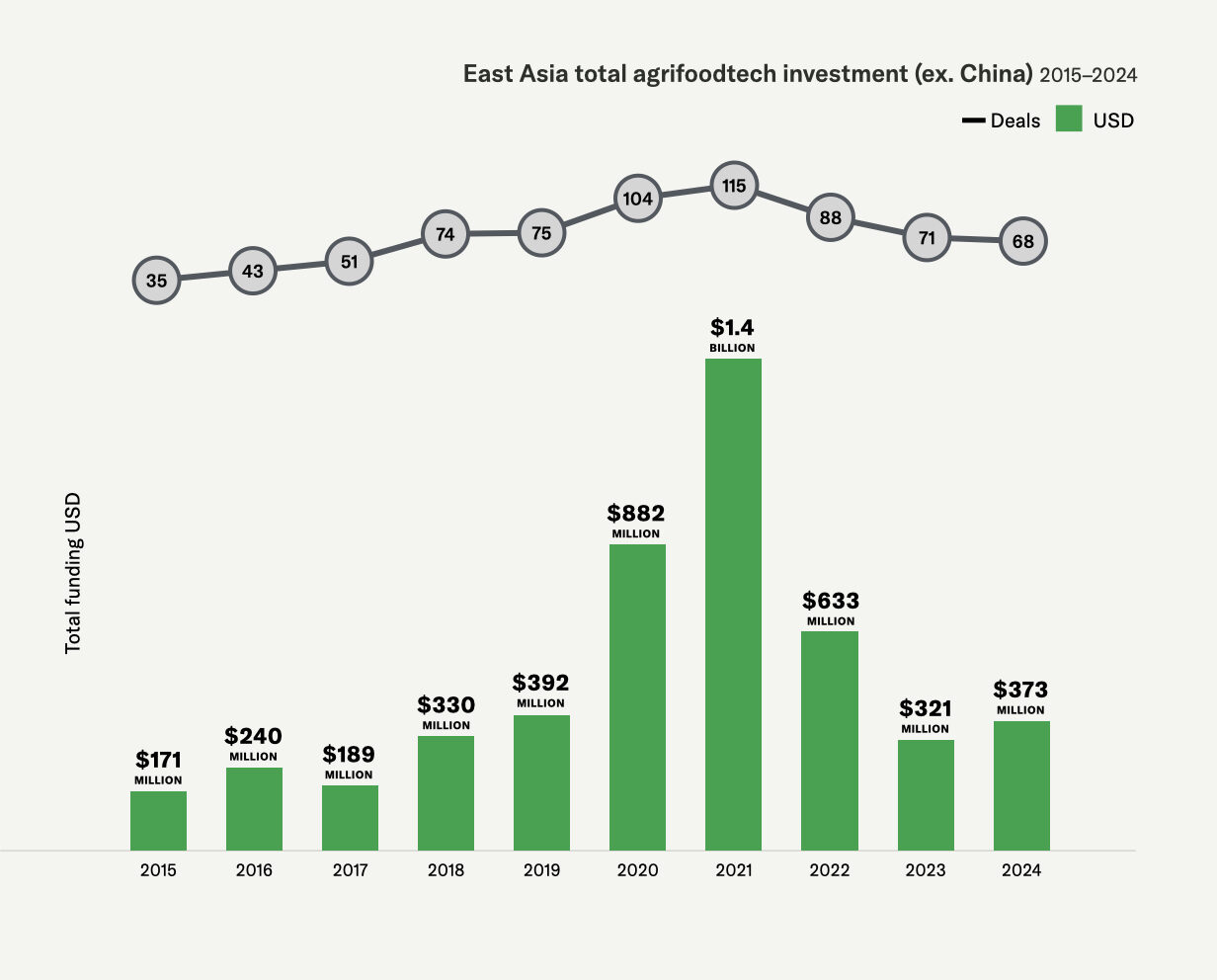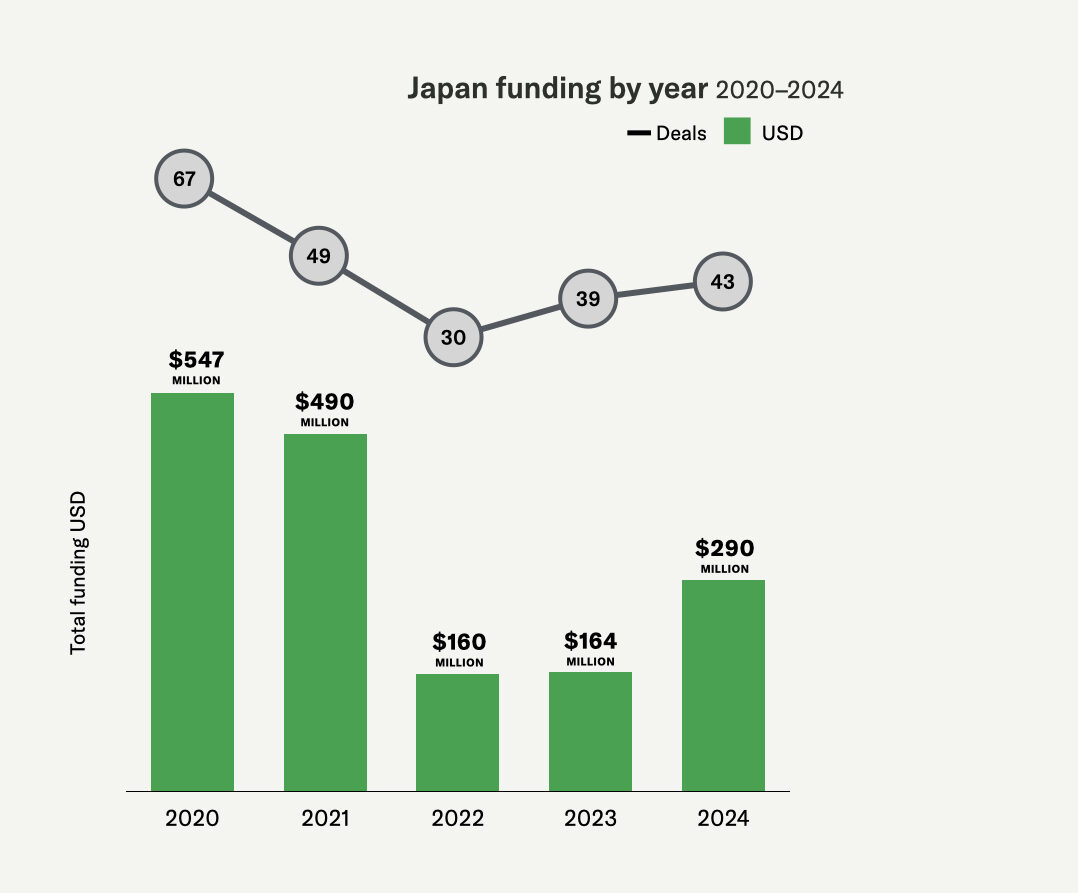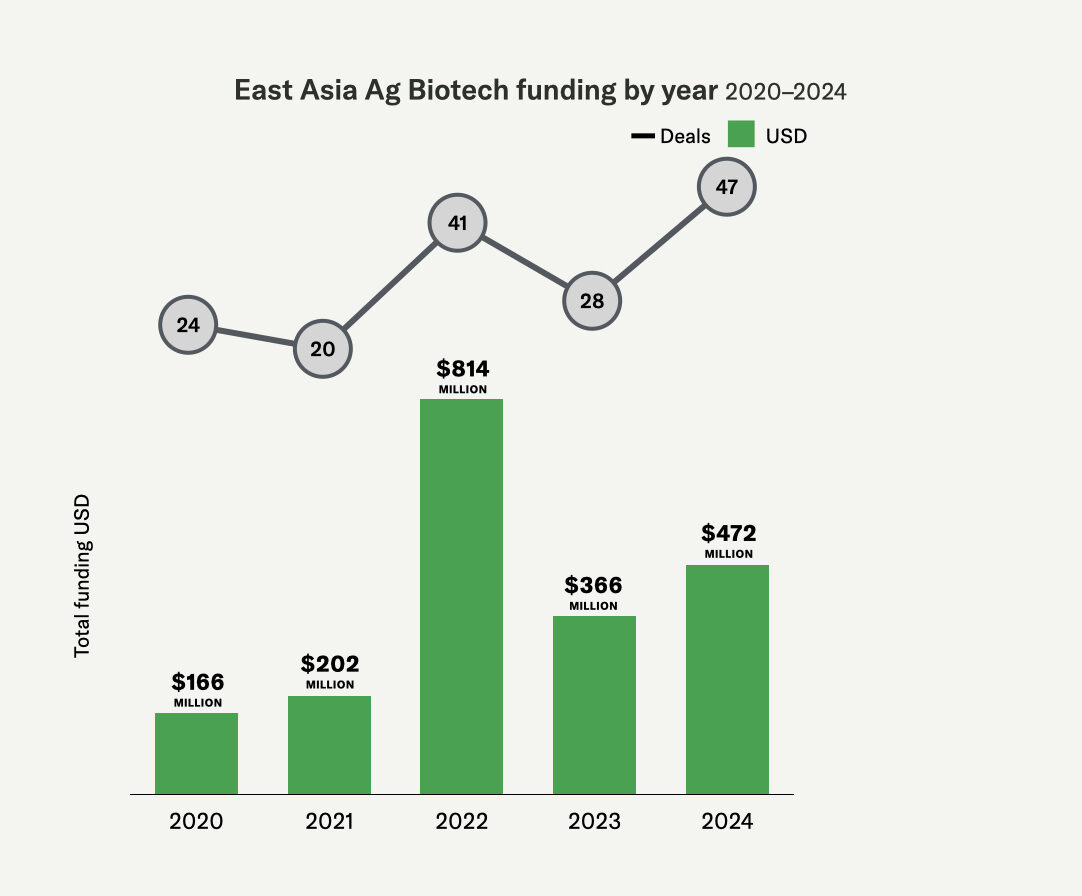[Disclosure: AgFunderNews’ parent company is AgFunder.]
Like most regions of the world, East Asia’s agrifoodtech industry suffered in 2024, posting a significant 40% year-over-year decline in funding, its lowest point in 10 years.
Collectively, agrifoodtech startups in China, Japan, South Korea, Hong Kong, and Taiwan raised $1.2 billion in 2024, according to AgFunder’s 2025 Global AgriFoodTech Investment Report.
However, that total does not tell the whole story for the subregion; the drop is mostly attributable to China.

Excluding China, agrifoodtech investment in East Asia grew—albeit by a small amount—from 2023 to 2024 and was almost on par with 2019 funding levels.
Japan’s agrifoodtech ecosystem performed particularly well, posting an increase in funding thanks to a major deal in biomaterials and a handful of growth-stage deals for restaurant tech and food delivery.

Positive growth for Japan led by Spiber
Japanese startups raised nearly $300 million in 2024, up 76% from 2023’s $164 million.
AgFunder partner Manuel Gonzalez says the convergence of “abundant, low-cost capital, world-class technology, and deep market access creates a unique platform for growth” in Japan, “not only in food and agriculture but in other sectors of the economy.”
Biomaterials startup Spiber‘s $65 million late-stage round contributed the most to Japan’s 2024 investment total, and was the only late stage company to close a round during the year.
Spiber uses a microbial-fermentation process to “brew” protein and create alternative materials to plastic, leather, and other materials. The company, which has been active since 2007, is probably better known in fashion and beauty circles than food and ag, given its partnerships with the likes of Patagonia, The North Face, and Shiseido Japan, to name a few.
Spiber is also responsible for a funding spike for the country in 2020, as the company raised more than half of that year’s total via two rounds. Thanks to those, Japan’s funding actually decreased in 2021, in contrast to trends around the rest of the world.

After Spiber, the next-largest rounds in 2024 went to restaurant-focused tech: Dinii’s mobile ordering/management platform for takeout nabbed $52 million, while order-ahead service Peco Free scooped up $24 million.
But there were other notable biotech rounds last year too, including fish-breeding platform Regional Fish, and Symbiobe, which leverages marine photosynthetic bacteria (microorganisms that live in the sea) to produce fertilizer, feed, and fiber alternatives.
“Japan’s food security hinges on overcoming the limiting factor of energy cost—especially as agriculture shifts toward an unmanned, AI-driven future,” notes Gonzalez. “Today, the nation is undergoing a tech renaissance through the Rapidus semiconductor project and increasing investment in AI infrastructure. Investment is going to energy, tech, and a very dynamic M&A deal flow (44% YoY growth).”
The eGrocery gold rush peaks—then plummets
The East Asia subregion holds some of the world’s earliest adopters of eGrocery and food delivery. Startups in the region have raised some of the largest venture capital rounds ever seen in the space.
Group-buying grocery platform Xingsheng Youxuan raised $3 billion in 2021 from the likes of Sequoia, Tencent, and others. The deal remains East Asia agrifoodtech’s top fundraise of all time.
Given the COVID-19 background, the eGrocery spike in 2021 is not surprising and was followed by a steep decline (nose-dive, in some cases) in line with eGrocery trends around much of the rest of the world.
However, East Asian countries were ahead of the curve for food delivery long before the Covid-19 pandemic made the format attractive to the masses; just look at South Korea’s farm-to-consumer eGrocery service HelloNature that raised $1.4 billion way back in 2014.
Chinese instant-delivery platform ELEME was a notable early entrant to the online restaurants space, having raised two billion-plus-dollar rounds two years in a row (2016 and 2017).
Times have changed.
In the years since the Covid-19 pandemic, investment to eGrocery in the region has tumbled from more than $6 billion in 2021 to just $29 million in 2024.
Top rounds in East Asia in 2024 suggest the category won’t be reliving its glory days anytime soon, as not a single eGrocery company showed up amid the top 20 rounds.
Self-sufficiency drives uptick in ag biotech investment
The ag biotech sector fared much better in 2024, with startups in East Asia raising $471 million across 47 rounds, up 29% from $367 million in 2023.
China took the bulk of the funds, scooping up all but one of the top rounds (which went to Japan-based Regional Fish), renewed by encouraging national policies.

China is aggressively pursuing biotechnology innovations, particularly when it comes to agriculture. As part of a push towards greater self sufficiency, the government unveiled a new strategic plan in February of this year that prioritizes ag biotech, breeding new seed varieties and use of AI in agriculture.
The focus on self sufficiency is, of course, partly in response to continued trade battles with the US.
South Korea, too, has pledged significant focus on biotech innovation, most notably with its bioeconomy plan for 2030 that in part aims to integrate biotech more deeply with agriculture. Some key initiatives include substantial investments in microbiome technology to develop eco-friendly fertilizers and pest control solutions.
In a guest post last year, South Korean impact investor and AgFunder data partner Sopoong Ventures went as far as to name its country a future hub for global biotech.
“The synergy between startups and established companies will drive technological innovations, creating a robust ecosystem that supports sustainable and efficient farming practices,” the company wrote.
In particular, microbiome-related products and fermentation technologies that can improve crop yield are a special focus, according to Sopoong.
For example, international food company CJ CheilJedang utilizes microbial fermentation for feed and fertilizers; the company acquired ChunLab (now CJ BioScience) in 2021.
Other notable South Korean biotech startups include Microbalance, which is utilizing microbiome technology in diverse agricultural applications, and Kookmin Bio, which raised $2.5 million last year, and specializes in biohealth food and pharmaceutical research and development.





